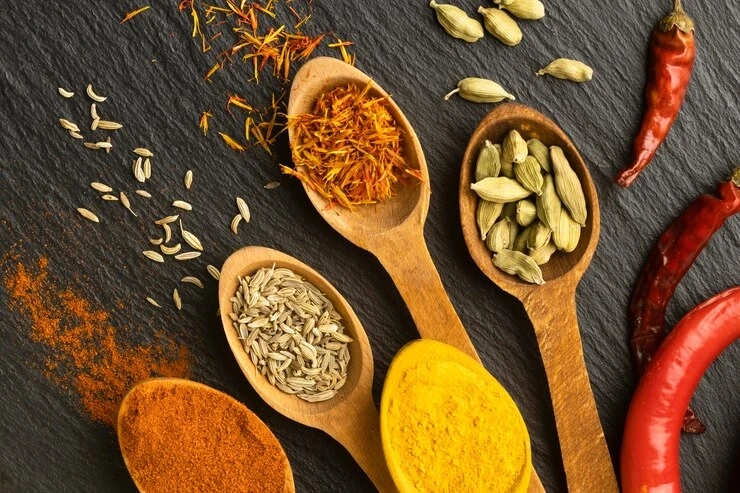Indian food is well known worldwide for its robust and nuanced flavors. Various spices that have been prized for millennia for their culinary skills and extraordinary health benefits are at the core of these flavor experiences. Let’s know some benefits of Indian spices.
1. Turmeric: The Golden Elixir of Nature
Turmeric powder sometimes known as the "golden spice," has attracted considerable scientific interest. Its vivid color is a reflection of the powerful chemical curcumin, which has shown strong antioxidant and anti-inflammatory effects. Due to these qualities, turmeric is a promising addition to foods that boost immune system function, promote joint health, and may lower the risk of chronic illnesses, including cancer and heart disease.
2. Cumin: An Intestinal Powerhouse
An essential ingredient in Indian cooking, cumin is prized for its hearty, earthy taste. Beyond its use in cooking, cumin has several health advantages. It helps digestion by boosting the pancreatic enzymes, allowing food to be digested more easily. The antibacterial properties of cumin also support general health and gut wellness.
3. The Natural Cooling Agent, Coriander
In Indian cooking, coriander leaves and seeds are fundamental ingredients. Coriander is well known for its calming effects and is frequently used to counterbalance the spiciness of other spices. By reducing bloating and gas, it aids in digestion. Additionally, coriander is a helpful complement to a balanced diet because it has demonstrated promise in controlling blood sugar levels.
4. The Queen of Spices is cardamom.
Cardamom, sometimes referred to as the "queen of spices," is prized for its fragrant, sweet taste. Cardamom has been used traditionally to treat respiratory problems, digestive pain, and dental health. Its diuretic actions can promote heart health, while its antioxidant qualities fight oxidative stress.
The diverse range of tastes and health advantages present in Indian cooking are perfectly embodied by these three spices. Including them in everyday meals helps support a healthy, colorful palette and general well-being.
5. Cloves: The Natural Protector of Oral Health
Cloves are little, fragrant flower buds that have a significant impact on dental health. For millennia, people have used their antimicrobial and antiseptic qualities to treat gum disease and toothaches. Cloves are high in antioxidants, which promote liver health and general well-being in addition to dental health.
6. Mustard Seeds: Little Giants
Be not deceived by their diminutive size; mustard seeds are nutrient-dense superfoods. Rich in omega-3 fatty acids, magnesium, and selenium, they support heart health. They are advantageous in the treatment of respiratory discomfort and muscle soreness due to their anti-inflammatory qualities.
7. Fenugreek: An Adaptable Health Benefit
A multipurpose plant that may be used in savory and sweet recipes, fenugreek has many health advantages. It is a useful tool for managing diabetes because of its capacity to control blood sugar levels. Fenugreek seeds are high in antioxidants and fiber, and it also lower inflammation and promote digestive health.
8. The spice of life (and health), cinnamon
Loved for its cozy, sugary taste, cinnamon is also a superfood. It has a well-established history of controlling blood sugar levels and improving insulin sensitivity. Cinnamon is a powerful anti-inflammatory and antioxidant that promotes general health and well-being.
These four spices are good examples of the amazing health benefits that can be found in Indian food. Including them in your diet can be a tasty method to promote general wellbeing.
9. Spices\' Underappreciated Hero: Black Pepper
Black pepper is the hidden star of the spice world, frequently overshadowed by its more showy counterparts. Justly dubbed the "king of spices," it is a mainstay in many cuisines across the globe. Black pepper contains a chemical called piperine, which is a potent enhancer that increases the absorption of essential nutrients like turmeric curcumin. Beyond its culinary abilities, black pepper has a wealth of health advantages, including antibacterial, anti-inflammatory, and antioxidant qualities.
A Wellness Path Infused with Spice
A trip through the world of Indian spices offers a mosaic of tastes and wellbeing advantages. These spices provide a comprehensive approach to well-being, from the digestive abilities of cumin and coriander to the anti-inflammatory qualities of turmeric and ginger. The wisdom of including these natural miracles in our diets is ageless, even as scientific research continues to unlock their complexity.
Accepting the rich history of Indian spices opens doors to a tasty and healthy world.



